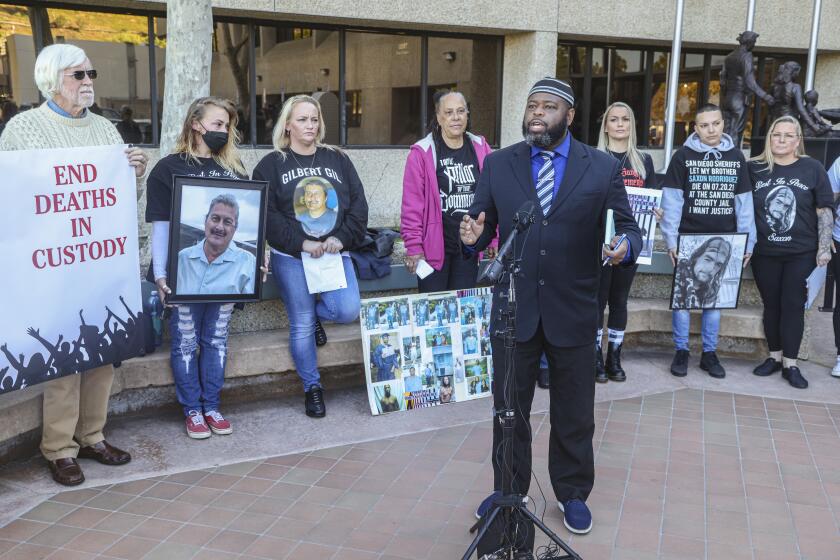Federal judge orders San Diego County sheriff to release internal records on jail deaths
- Share via
SAN DIEGO — A federal judge on Wednesday ordered the San Diego County Sheriff’s Department to unseal internal records on deaths inside jails, siding with the Union-Tribune and other news outlets seeking documents turned over to a plaintiff’s lawyers in litigation that was recently settled.
San Diego County has the highest jail mortality rate among California’s largest counties, the Union-Tribune found in 2019 in a six-month investigation.
The documents, which are related to deaths and injuries sustained by 12 people in county custody, will not be immediately released to the public.
Instead, records of the sheriff’s Critical Incident Review Board will be provided to the news organizations’ legal team by June 7, Judge Jinsook Ohta ruled. The team will then meet with county lawyers within two weeks to determine what details to redact in the interest of privacy.
“There are valid and compelling reasons for the public to be informed about conditions inside the county jails,” the judge said. “The public has an interest in those documents.”
The Critical Incident Review Board is made up of the department’s top leaders. It meets regularly to review allegations of misconduct and excessive force among deputies and to consider legal threats against the department.
The motion comes after San Diego County settled a lawsuit filed by a man who was seriously injured in jail for almost $8 million.
Ohta said a final order would be entered into the court docket soon.
At issue is a set of reports that were filed under seal in a civil case against San Diego County brought by Frankie Greer, who was seriously injured while being held at the Men’s Central Jail in 2018.
The lawsuit was settled for $7.75 million in March before the question of whether the reports should be unsealed was resolved. The Union-Tribune, Voice of San Diego and Prison Legal News magazine intervened later in March to request that the records be released.
Attorney Timothy Blood, one of the lawyers who filed the request on behalf of the news organizations, praised the decision outside court: “The public can start the dialogue and analyses that the sheriff promised but isn’t doing as far as examining the jail deaths and injuries.”
‘The families of the folks who have died are certainly not seeing the CIRB reports,’ the oversight board’s executive officer said. ‘Nobody is getting those reports.’
Steven Boehmer, one of the private-sector lawyers hired to defend the county in the Greer case, declined to comment on the ruling.
The decision comes as a growing number of people have expressed an interest in seeing the findings from the sheriff’s internal review panel.
While running for sheriff last year, Kelly Martinez pledged to release the board’s reports to the public if she was elected. But after winning in November, Martinez reversed course and decided to instead release only brief summaries of the internal meetings.
Separate reports from the California state auditor and the county’s Citizens’ Law Enforcement Review Board also recommended that the Critical Incident Review Board documents be released publicly. At the same time, a bill working through the state Legislature would require the reports be disclosed.
Lawyers for San Diego County argued that the records should be withheld under the attorney-client privilege and that disclosing them would undermine the Sheriff’s Department’s ability to examine missteps and misconduct by staff.
But the judge disagreed.
“The court is not convinced by the arguments here that releasing the records would have a chilling effect” on future Sheriff’s Department deliberations, she said.
The lawyers who represented Greer had tried unsuccessfully to obtain reports in two earlier jail death lawsuits. But in 2021, a federal appeals court ruled in an unrelated case that businesses and public entities cannot withhold such records under the attorney-client privilege.
In that case, the court said documents need to pass a “primary-purpose test,” meaning that for a record to be reasonably withheld, delivering legal advice must be its primary purpose, not just one of several purposes.

Greer’s lawyers argued that the Critical Incident Review Board serves multiple purposes: reviewing staff behavior for possible discipline or termination and evaluating potential legal threats to the Sheriff’s Department.
They also submitted a sworn declaration from former Cmdr. David Myers, who served on the internal review panel.
“I was never given warnings not to share the documents or to keep them confidential or secret,” wrote Myers, who ran unsuccessfully for sheriff in 2018 and again in 2022. “I was never told the documents were privileged.”
Lawyers for the Union-Tribune and the other news outlets will review the reports from a dozen other cases once they are received from the county. Both sides will then propose specific rules over how medical and other private information will be handled.
If the two sides agree to a process that would protect the subjects, the reports from the 12 other deaths and injuries could be released in the coming weeks.
The county lawyers, however, indicated they planned to appeal Ohta’s ruling, which would probably delay any release of the reports.
Last year, a record 20 people died in San Diego County jails, including one man who was compassionately released hours before he died.
This year, six men and women have died in Sheriff’s Department custody.
More to Read
Sign up for Essential California
The most important California stories and recommendations in your inbox every morning.
You may occasionally receive promotional content from the Los Angeles Times.

















